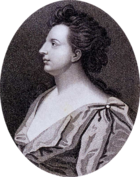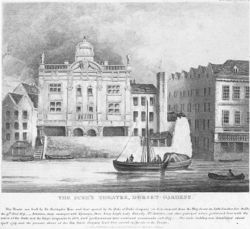
Elizabeth Barry
Encyclopedia

England
England is a country that is part of the United Kingdom. It shares land borders with Scotland to the north and Wales to the west; the Irish Sea is to the north west, the Celtic Sea to the south west, with the North Sea to the east and the English Channel to the south separating it from continental...
actress of the Restoration
English Restoration
The Restoration of the English monarchy began in 1660 when the English, Scottish and Irish monarchies were all restored under Charles II after the Interregnum that followed the Wars of the Three Kingdoms...
period.
She worked in big, prestigious London
London
London is the capital city of :England and the :United Kingdom, the largest metropolitan area in the United Kingdom, and the largest urban zone in the European Union by most measures. Located on the River Thames, London has been a major settlement for two millennia, its history going back to its...
theatre companies throughout her successful career: from 1675 in the Duke's Company
Duke's Company
The Duke's Company was one of the two theatre companies that were chartered by King Charles II at the start of the English Restoration era, when the London theatres re-opened after their eighteen-year closure during the English Civil War and the Interregnum.The Duke's Company had the patronage of...
, 1682 – 1695 in the monopoly United Company
United Company
The United Company was a London theatre company formed in 1682 with the merger of the King's Company and the Duke's Company.Both the Duke's and King's Companies suffered poor attendance during the turmoil of the Popish Plot period, 1678–81...
, and from 1695 onwards as a member of the actors' cooperative usually known as Betterton
Thomas Betterton
Thomas Patrick Betterton , English actor, son of an under-cook to King Charles I, was born in London.-Apprentice and actor:...
's Company, of which she was one of the original shareholders. Her stage career began 15 years after the first-ever professional actresses had replaced Shakespeare's boy heroines on the London stage. The famous actor Thomas Betterton
Thomas Betterton
Thomas Patrick Betterton , English actor, son of an under-cook to King Charles I, was born in London.-Apprentice and actor:...
said that her acting gave "success to plays that would disgust the most patient reader", and the critic and playwright John Dennis
John Dennis
John Dennis was an English critic and dramatist.-Life:He was born in Harrow, London. He was educated at Harrow School and Caius College, Cambridge, where he took his B.A. degree in 1679. In the next year he was fined and dismissed from his college for having wounded a fellow-student with a sword....
described her as "that incomparable Actress changing like Nature which she represents, from Passion to Passion, from Extream to Extream, with piercing Force and with easy Grace".
Early career
A frequently repeated anecdote holds that the 17-year-old Barry at first performed so unskillfully that she was fired from the company several times, but was transformed into a brilliant actress by the coaching of her lover, John Wilmot, 2nd Earl of RochesterJohn Wilmot, 2nd Earl of Rochester
John Wilmot, 2nd Earl of Rochester , styled Viscount Wilmot between 1652 and 1658, was an English Libertine poet, a friend of King Charles II, and the writer of much satirical and bawdy poetry. He was the toast of the Restoration court and a patron of the arts...
. While multiple sources confirm that Rochester was Barry's lover, the only source for the coaching story is a Life of Barry published in 1740 – 65 years after the events – by Edmund Curll
Edmund Curll
Edmund Curll was an English bookseller and publisher. His name has become synonymous, through the attacks on him by Alexander Pope, with unscrupulous publication and publicity. Curll rose from poverty to wealth through his publishing, and he did this by approaching book printing in a mercenary...
, well-known for his fanciful and inaccurate biographies.
Barry was a successful comedienne who created a variety of Restoration comedy
Restoration comedy
Restoration comedy refers to English comedies written and performed in the Restoration period from 1660 to 1710. After public stage performances had been banned for 18 years by the Puritan regime, the re-opening of the theatres in 1660 signalled a renaissance of English drama...
heroines throughout her career, but her greatest impact on Restoration drama was as a tragic
Tragedy
Tragedy is a form of art based on human suffering that offers its audience pleasure. While most cultures have developed forms that provoke this paradoxical response, tragedy refers to a specific tradition of drama that has played a unique and important role historically in the self-definition of...
actress. Her capacity for projecting pathos was an inspiration to playwrights Thomas Otway
Thomas Otway
Thomas Otway was an English dramatist of the Restoration period, best known for Venice Preserv'd, or A Plot Discover'd .-Life:...
and Thomas Southerne
Thomas Southerne
Thomas Southerne , Irish dramatist, was born at Oxmantown, near Dublin, in 1660, and entered Trinity College, Dublin in 1676. Two years later he was entered at the Middle Temple, London....
in the three famous tragic roles they wrote for her: Monimia in Otway's The Orphan (1680), Belvidera in Otway's Venice Preserved (1682), and Isabella in Southerne's The Fatal Marriage (1694). These three roles, wrote the prompter John Downes
John Downes
John Downes may refer to:*John Downes , English commissioner convicted of regicide of Charles I of England at the restoration of Charles II*John Downes John Downes may refer to:*John Downes (regicide) (1609 – c. 1666), English commissioner convicted of regicide of Charles I of England at the...
, "gain'd her the Name of Famous Mrs. Barry, both at Court and City, for when ever She Acted any of these three Parts, she forc'd Tears from the Eyes of her Auditory, especially those who have any Sense of Pity for the Distress't."

Colley Cibber
Colley Cibber was an English actor-manager, playwright and Poet Laureate. His colourful memoir Apology for the Life of Colley Cibber describes his life in a personal, anecdotal and even rambling style...
recalled the power of her voice: "When distress of Tenderness possess'd her, she subsided into the most affecting Melody and Softness. In the Art of exciting Pity, she had a Power beyond all the Actresses I have yet seen, or what your Imagination can conceive." Elizabeth Howe has argued that it was Barry's success in the role of Monimia that "clinched the movement away from heroic drama
Heroic drama
Heroic drama is a type of play popular during the Restoration era in England, distinguished by both its verse structure and its subject matter. The sub-genre of heroic drama evolved through several works of the middle to later 1660s; John Dryden's The Indian Emperour and Roger Boyle's The Black...
and started the establishment of 'she-tragedy
She-tragedy
The term she-tragedy refers to a vogue in the late 17th and early 18th centuries for tragic plays focused on the sufferings of an innocent and virtuous woman...
' as a popular genre." Barry was always described as being a plain woman. Portraits suggest intelligence but heavy features, and the playwright Thomas Shadwell writes in a letter in 1692 that it would have been better to have staged Nicholas Brady's The Rape in Roman dress, "and then w'th a Mantle to have covered her hips Mrs Barry would have acted ye part." Apparently none of this mattered to contemporaries. Even though Barry was "the ugliest Woman" in the world off stage, wrote the anonymous A Comparison Between the Two Stages (1702), she was "the finest Woman in the World upon the Stage."
Later career
Barry worked for the Duke's CompanyDuke's Company
The Duke's Company was one of the two theatre companies that were chartered by King Charles II at the start of the English Restoration era, when the London theatres re-opened after their eighteen-year closure during the English Civil War and the Interregnum.The Duke's Company had the patronage of...
from 1675 to 1682, taking the role of Cordelia opposite Thomas Betterton
Thomas Betterton
Thomas Patrick Betterton , English actor, son of an under-cook to King Charles I, was born in London.-Apprentice and actor:...
's Lear in Nahum Tate
Nahum Tate
Nahum Tate was an Irish poet, hymnist, and lyricist, who became England's poet laureate in 1692.-Life:Nahum Teate came from a family of Puritan clergymen...
's 1681 adaptation of Shakespeare's King Lear
The History of King Lear
The History of King Lear is an adaptation by Nahum Tate of William Shakespeare's King Lear. It first appeared in 1681, some seventy-five years after Shakespeare's version, and is believed to have replaced Shakespeare's version on the English stage in whole or in part until 1838.Unlike Shakespeare's...
. After the Duke's and the King's companies were amalgamated in 1682, she continued as one of the star performers of the new United Company
United Company
The United Company was a London theatre company formed in 1682 with the merger of the King's Company and the Duke's Company.Both the Duke's and King's Companies suffered poor attendance during the turmoil of the Popish Plot period, 1678–81...
, which remained for 12 years the only theatrical company in London. The absence of rival companies left the actors in a weak bargaining position in relation to management, and when the United Company fell under the mismanagement of Christopher Rich (theatre manager)
Christopher Rich (theatre manager)
Christopher Rich was a lawyer and theatrical manager in London in the late 17th and early 18th century, and the father of the important impresario John Rich...
in the 1690s, "as sly a Tyrant as ever was at the Head of a Theatre," the senior actors including Barry, Betterton and Anne Bracegirdle
Anne Bracegirdle
Anne Bracegirdle was an English actress.Little is known of Bracegirdle's early life. Her precise date of birth is a source of great dispute due to conflicting records of her life. She was baptised in Northampton on 15 November 1671, although her tombstone says that she died at the age of 85...
left to form their own collaborative company. Barry was one of the original patent-holders of the actors' company, which opened at Lincoln's Inn Fields with the smash hit of William Congreve's Love For Love in 1695 and continued to successfully challenge Rich's United Company.
Barry achieved remarkable public approval and business success for a single woman in London in the late 17th century, especially considering that she was generally known to have a daughter by Rochester and another by the playwright George Etherege
George Etherege
Sir George Etherege was an English dramatist. He wrote the plays The Comical Revenge or, Love in a Tub in 1664, She Would if She Could in 1668, and The Man of Mode or, Sir Fopling Flutter in 1676.-Early life:George Etherege was born in Maidenhead, Berkshire, around 1635, to George Etherege and...
. Many actresses at this time achieved the prize of respectability by being married, usually to actors, but Barry never married. In 1709 she retired from the stage.
Fictional portrayals
Barry is a supporting character in The Libertine, Stephen Jeffrys' play about John Wilmot's life, as well as its 2004 film adaptation, in which she is portrayed by Samantha MortonSamantha Morton
Samantha Jane Morton is an English actress and film director. She began her performing career with guest roles in television shows such as Soldier Soldier and Boon before making her film debut in the 1997 drama film This Is the Sea, playing the character of Hazel Stokes...
.

